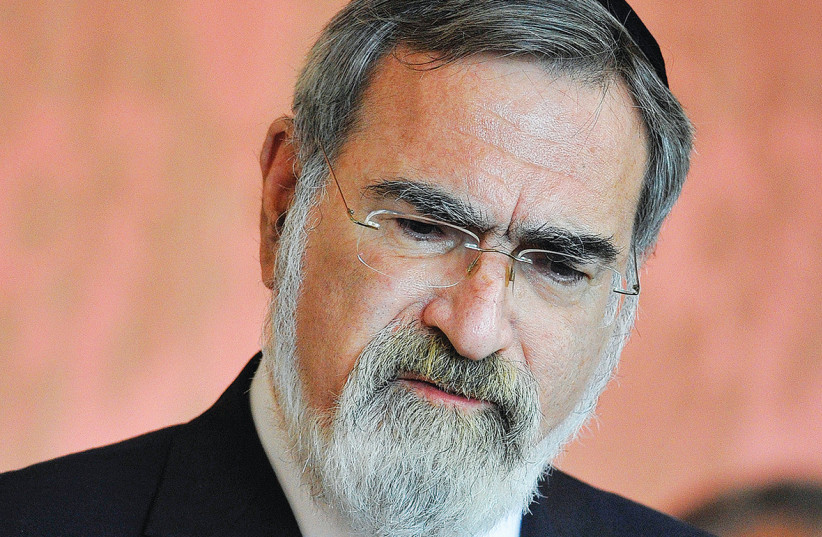The yahrzeits (memorials) of three very different Anglo rabbis were observed this past week: Jonathan Sacks, Shlomo Carlebach and Meir Kahane. Each of these rabbis were honored by different (and to a degree, overlapping) Jews.
I hesitate to lump these three individuals into one sentence or column. The elevated expositions of Rabbi Sacks, the beautiful teachings of Rabbi Carlebach and the angry warnings of Rabbi Kahane are not of equal value or validity.
Yet they are, perhaps, various sides of the Jewish soul, at different times and in dissimilar circumstances. Each of them was controversial, to varying degrees.
Rabbi Jonathan Sacks: A unique voice of wisdom
JONATHAN SACKS, the celebrated former British chief rabbi who passed away two years ago (on 20 Heshvan 5781), brought Jewish theology and philosophy to bear on the grand debates underway in modern economics and social policy, psychology, political science, science, art, architecture and engineering.

He synthesized enormous erudition in the history of science and philosophy and the history of religion with investigations of the biblical narrative – to craft a religious cosmology that can save 21st-century mankind from self-immolation.
Rabbi Sacks believed and taught that the moral decline of the Western world could be counteracted by recommitment to the values taught by biblical tradition, and, specifically, the ethical and ideological principles embedded in Jewish civilization.
He showed how tribalism can be balanced with universality; how spiritual and social cohesion can be synthesized with respect for the liberty of conscience and the “dignity of difference” (of others).
Essential to Sacks’s argument was that religion is truly essential in the modern world; perhaps more necessary than ever! “A sense of the sacred,” he wrote, “is what lifts us above instinct and protects us from our dysfunctional drives. When human beings lose respect for God, they eventually lose respect for humanity.”
Rabbi Sacks taught that Jews must not simply receive from the world; we must also give. As he wrote, “To be a Jew is to be true to our faith while being a blessing to others regardless of their faith.” Jews must help “heal a fractured world” and live up to the “ethics of responsibility.” With his face to the future, he taught that different groups, Jews included, must “build a home together,” a society for the common good, even while keeping their distinctive characters.
In short, Rabbi Sacks was a unique voice of wisdom in this troubled age. He offered a path forward. For Jews: A path grounded in absolute fealty to Halacha and authentic rabbinic teachings alongside embrace of universal verities and modern intellectual advances. For gentiles: A path grounded in biblical morality, while embracing the history of liberty. Atop it all: Courage to confront the nihilism that currently passes for “enlightenment.”
The haredi (ultra-Orthodox) world did not like Rabbi Sacks’s theological relativism (– he wrote that no one creed has a monopoly on spiritual truth), but oh well.
Rabbi Shlomo Carlebach: Storyteller, scholar, saver of souls
SHLOMO CARLEBACH, who passed away 28 years ago (16 Heshvan 5755), was an atypical rabbi. He was a singer and composer, storyteller, scholar and saver of souls, who exemplified and taught ahavat hinam (boundless love).
Indeed, he was an ahavat hinam extremist. “Reb Shlomo,” as he was known, loved all Jews to the fullest and was prepared to go to the farthest lengths to bring them back to tradition.
Who else was prepared to foray into the ashrams, communes and pubs of the 1960s flower-child generation, showering love and acceptance upon all? Only Reb Shlomo was prepared to take the beauty of Jewish mystical teachings and song to the Berkeley Folk Festival, to “Holy Man Jamborees” and “Whole Earth Expos” – which were packed with wandering Jewish youth searching for love and spiritual meaning.
Reb Shlomo reclaimed thousands of “holy hippilech,” as he called them, from Haight-Ashbury to Metulla and Mumbai, offering personal redemption through ecstatic song, meditative prayer, and most of all, brotherly love.
Carlebach never raised his voice in anger, nor did he hit back at his many detractors, even when they insulted him to the core. To his assailants he would say, “Hate is a poison that corrodes the soul.” Then he would kiss them on the forehead – men and women, secular and religious, Jew and non-Jew alike.
Jewish unity, he reminded everybody, depends on how you approach the person who disagrees with you. Very, very few things are worth hating for.
Of all the thousands of songs that he composed, his favorite was “Lema’an Achai Verey’ay,” “For the Sake of My Brothers and Friends, I Will Sing for You Peace.” It was “the highest of high,” the “deepest of deep of songs,” he was wont to say.
Reb Shlomo’s teachings are still relevant, and his fame seems to be ever-growing. His name is clouded by posthumous reports of philandering, which is sad, but this does not erase his overwhelmingly enterprising legacy.
Rabbi Meir Kahane: Controversial Jewish supremacist
MEIR KAHANE, who was assassinated by an Islamist extremist 32 years ago (18 Heshvan 5751) was yet something else altogether. He was a writer and ultra-nationalist leader who espoused Jewish superiority and power. He is considered to have been the most anti-Arab and even racist figure in Israeli politics.
With his admirer, Itamar Ben-Gvir about to become a minister in the cabinet, and the specter of last year’s Arab-Israeli riots haunting this country, Rabbi Kahane’s worldview is back in the public eye.
As opposed to Carlebachian love, Kahane taught that “Love has its place, as does hate. Peace has its place, as does war. Mercy has its place, as do cruelty and revenge… It is not decency or goodness of gentleness that impresses the Middle East, but strength.”
“All the Arabs in the world are not worth one Jew,” Kahane thundered, and “every Arab dreams of massacring the Jews.” Among others, for him this meant the need “to stem the huge growth of Arabs in Israel by finishing the exchange of populations that began in the 1940s” (i.e., the transfer of Arabs out of Israel).
“Alas the Israeli-Jewish Left,” he fulminated, “breathes guilt and lives self-flagellation.” The Jewish people’s last stand was in Israel, he argued, and all means were kosher to ensure its survival and flourishing “as a state loyal to God and his Torah.”

“It is incumbent upon the Jewish people to understand its greatness and believe in it so that we do not cheapen and profane ourselves,” Kahane emphasized. “The Jewish brain must be attached to a Jewish fist.”
“There is no such thing as Jewish terrorism; there only are Jewish Maccabees,” he averred.
To say that Kahane’s violent Weltanschauung is exceptionally controversial and that some of his statements were reprehensible is an understatement. In the current Israeli political context, “Kahanism” is downright dangerous. But his emphasis on Jewish self-respect and Israeli security is not without salience, as evidenced by the recent Israeli election result.
Moreover, it ought to be remembered that Kahane awakened Jewish pride in many neurotic American Jewish youth after the Shoah. His warning that antisemitism was alive and well in America proved prescient, at a time when the entire American Jewish establishment was in denial. He almost singlehandedly put the issue of Soviet Jewry on the radar of the global Jewish community, too.
But I am certainly not endorsing Kahanism. Nor am I ranking him or equating Kahane with the two other rabbinic figures discussed here. As they emphatically say in Yiddish, lehavdil! No moral equation intended!
The challenge is finding the right mix of their mores while remaining solidly within the bounds of Jewish tradition and Israeli democratic consensus, which include civility, tolerance and respect for the image of God in all His creations.
The writer is a senior fellow at The Kohelet Forum and in the research department of Israel’s Defense and Security Forum (Habithonistim). The views expressed here are his own. His diplomatic, defense, political, and Jewish world columns over the past 25 years are archived at davidmweinberg.com.
